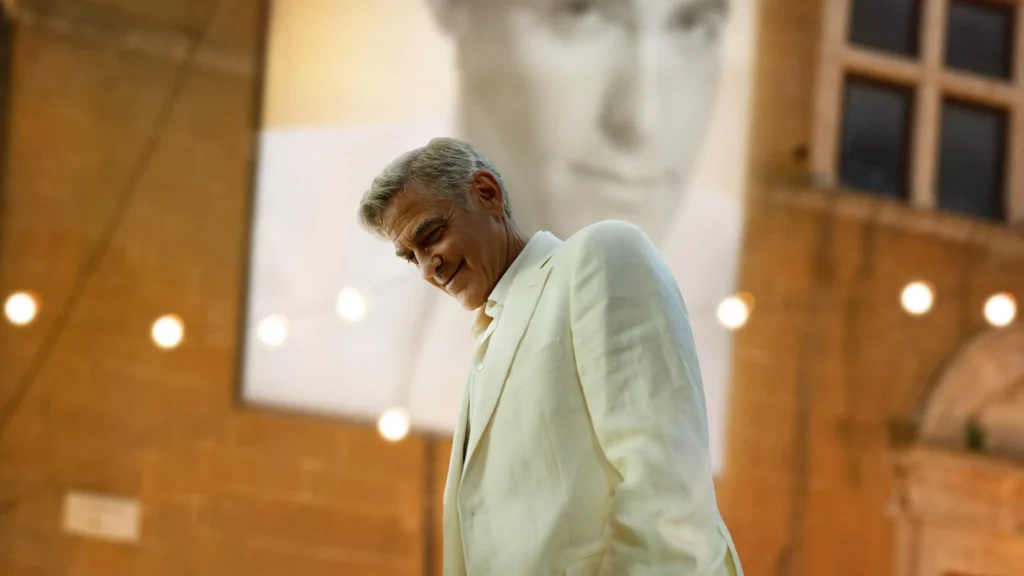Noah Baumbach’s (Marriage Story) ode to Hollywood is a smug affair that isn’t sure if you’re supposed to root for or dislike the titular Jay Kelly (George Clooney). Think Fellini’s 8 ½, only told in the most New York way possible, and you’ll have this Netflix sentimental drama.
After over three decades in Hollywood and the death of his mentor, Peter Schneider (Jim Broadbent), Jay Kelly is rethinking his life. Yes, he is rich, famous, and beloved around the world, but it all comes at a sacrifice. His career forced him to miss out on the big moments in the lives of his daughters, Jessica and Daisy (Riley Keough and Grace Edwards). He is always surrounded by people, a known name internationally. The only man he can call his true friend is Ron (Adam Sandler).
Jay’s journey of self-discovery begins when he meets up with Timothy (Billy Crudup), an old friend from acting classes. Timothy believes Jay’s behavior at an audition almost 40 years ago stole his only shot at stardom. Their physical fight triggers something in Jay, who suddenly wants to travel to Italy to find his daughter, Daisy, on her European trip.
Jay Kelly has the potential to be a character study of an aging Hollywood star grappling with mortality, the sacrifices he makes, and the state of play of his career as he gets older. Yet Baumbach and co-writer Emily Mortimer choose the safe, gentle route and use the movie to eulogize filmmaking.

A European Trip With Jay Kelly
Jay Kelly and his faceless entourage, which includes manager Ron, his publicist Liz (Laura Dern), and dresser Candy (Emily Mortimer), head off to Europe to find his youngest daughter and collect a lifetime achievement from an Italian festival.
Through a poorly thought-out plot McGuffin, Jay finds his teenage daughter is on an Italian train with her friends. The film treats Italian transport as some quaint, charming affair, which comes across as a tad belittling. Jay marvels at the small details, like a prisoner remembering the outside world. It’s not endearing, it’s patronising.
Every single passenger on this train just happens to be the biggest Jay Kelly fan alive. The passengers, who include actors like Patsy Ferran, Jamie Demetriou, and Annabel Mullion, all fawn over the actor who loves every second of it. Jay Kelly is not a tortured artist, he loves being famous, and it’s in these moments that it’s hard to sympathize with the man. He is someone who hides away from fame and attention, he can’t wait to meet his fans and hear how his on-screen work changed their lives.
The middle act of Jay Kelly meanders through his midlife crisis. It’s a pleasant and entirely watchable jaunt led by Clooney at his most charming, but it’s hardly the most gripping bit of cinema this year. The side quest of Jay playing a hero and saving a woman from a thief feels out of place in the wider story. It’s one of the many signs the writers don’t know how to get Jay from A to B.

Who Is Jay Kelly?
Jay Kelly is a confused melting pot of half-baked ideas. Like a PowerPoint presentation, topics and themes are addressed, but the writing moves on before it can scratch the surface and get to the meat and bones.
The writing also fails to understand who Jay is and why we should care. Is he an egotistic actor and a bad father who audiences should pity and dislike, or is he a charming star who deserves the constant fawning? Because Jay is such an underbaked figure, it’s hard to connect with him or understand why we should follow his journey.
Jay Kelly is simultaneously a film about moving forward and being stuck in the past. While Jay is a man looking forward to a life without Hollywood, he can’t help but be stuck in the past. Flashbacks are peppered throughout the film, with modern-day Jay often sitting in the corner watching his own life like it was a movie. At one point, he declares, “All my memories are movies,” and that is exactly what Baumbach wants audiences to take away from this film. It’s a lovely sentiment, but a shallow one.
Adam Sandler Steals The Show From Clooney
Jay Kelly was written for George Clooney, and it’s incredibly transparent that he’s a fictional stand-in for the Oscar-winner. The two even share the same backstory, with the writers not even trying to hide the similarities.
Clooney doesn’t get too much meat to chew on. But few people still alive and working ooze old Hollywood charm like the actor. It’s an easy role for Clooney, who just gets to play the most adored version of himself.
Only when Jay meets up with his father (Stacy Keach) do we start to see who he really is. Sadly, it’s two hours too late into proceedings before we finally see Jay’s softer, non-Hollywood side. Similar scenes with Jay’s daughters could have helped audiences better understand their relationship. This wants to be the heart of the film, without doing the necessary groundwork.
The real scene stealer here is Adam Sandler. Jay’s name may be in lights, but Sandler’s manager Ron is the only fully fleshed character in the film. He has a life outside of Jay and Hollywood. He has a loving but underwritten wife (played by Noah Baumbach’s real-life partner Greta Gerwig), and a passion for playing doubles tennis with his teenage daughter. You feel like you could go out for a drink with Ron. As none of the other characters feel like real people.

Ron is the only person who can tell Jay to quit it without repercussions. Not just a manager, he is a real friend to the actor and can pull him into the hypnotic trance that is fame and fortune. Sandler isn’t exactly playing off-type here, but he is the much-needed heart and soul to the movie.
Everyone else in Jay Kelly’s life is a caricature. Their whole existence is to either praise or put down the leading man. This is particularly insulting for Laura Dern. She spends the entire film making exasperated phone calls and wandering around public transport looking important. Most of the supporting cast, made up of European character actors, are treated more as cameos than genuine side characters.
The Worst Montage Since Babylon
All roads lead to an Italian film festival where Jay receives a lifetime achievement award. The film award comes with a long montage of Clooney’s real-life career. Fact and fiction blend into one another, as Jay Kelly’s career in Hollywood becomes George Clooney’s.
After sitting for two hours waiting for an emotional resolution, the last thing people want to see is a montage of a career. If this had included a young Jay (as played by Louis Patridge in flashback scenes) in these scenes with his fictional filmography, there would have been some interest. Instead, it’s endless scenes from the best of Clooney, From Dusk Till Dawn, Ocean’s Eleven, and Syriana.
The final moments of this film soon switch into a surprisingly emotional closing scene. We spend the last minutes of Jay Kelly with his daughters, in a theatre of his history. It’s emotionally manipulative but effective. Where was this emotive writing 130 minutes earlier?
Final Thoughts
As a tribute to Hollywood, Jay Kelly is a charming romp through one star’s midlife crisis. As a picture of a man in his 60s realising his mistakes, it’s a schmaltzy, cheesy-fest that fails to let its lead dive too deeply into its protagonist’s inner workings. The writing gives the audience no reason to care about Jay, his family, and his team. Forcing an emotional connection with manipulative montages.
For more Reviews, make sure to check back to That Hashtag Show.

![‘Jay Kelly’: George Clooney Schmoozes Hollywood In Sentimental Dramedy [Review]](http://18.211.146.234/wp-content/uploads/2025/10/e8404d3f-035f-4906-9e70-f98db3f94541-1280x640.jpg)
![Kenner Tribute Ultimate Panther Alien Card Art Reveal [31 Nights Of Fright]](http://18.211.146.234/wp-content/uploads/2021/10/neca-31-nights-of-fright-aliens-cover-440x264.jpg)

![[Review] Blessed Day, The Handmaid’s Tale Is Back For Season Four!](http://18.211.146.234/wp-content/themes/Extra/images/post-format-thumb-text.svg)
